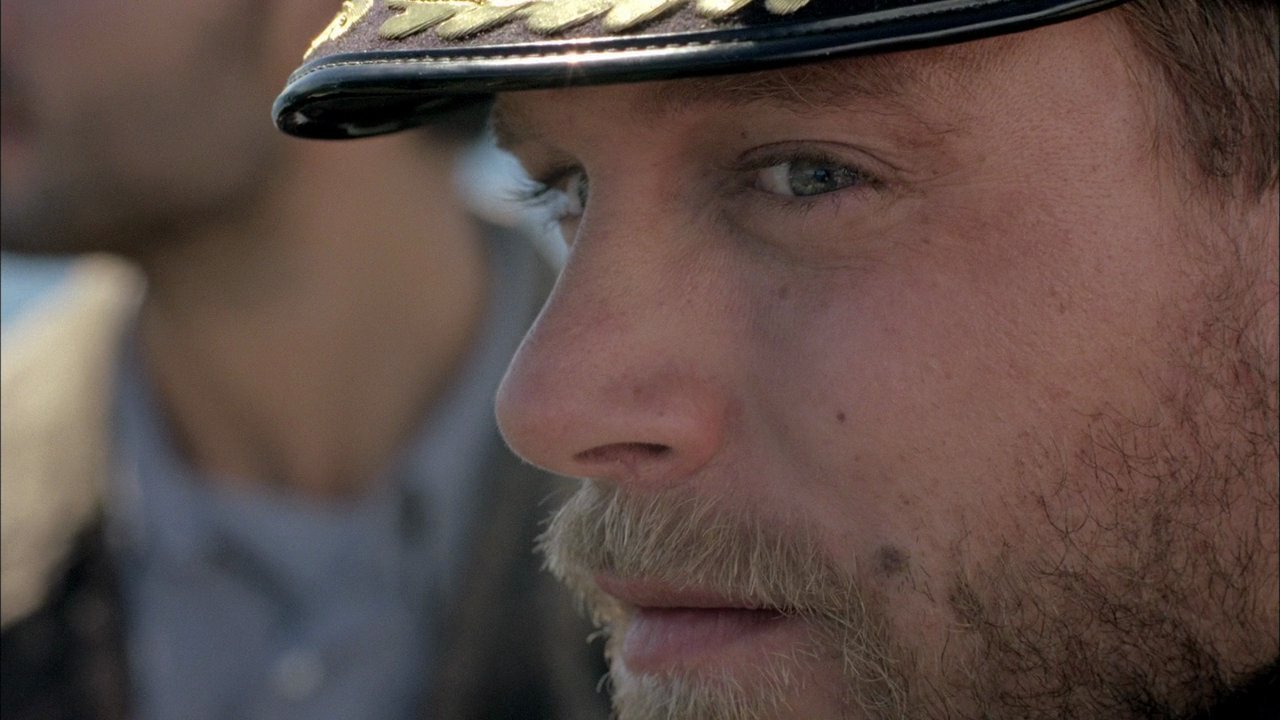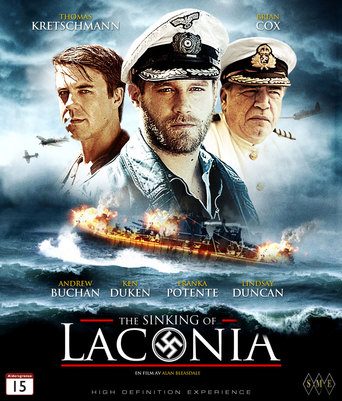


Absolutely amazing
... View MoreBlending excellent reporting and strong storytelling, this is a disturbing film truly stranger than fiction
... View MoreThis is a must-see and one of the best documentaries - and films - of this year.
... View MoreThrough painfully honest and emotional moments, the movie becomes irresistibly relatable
... View MoreWe don't hear much about the sinking of the British troop ship Laconia because the story ends neither with an Allied victory nor a glorious last stand. We can hear about the battles of Britain or Pearl Harbor or Midway but not the sinking of the Laconia, any more than we can stand to hear about the battles of the Java Sea, Savo Island, or Kasserine Pass. As human beings we prefer our movies to be cooked rather than raw.The facts in the case of the Laconia are clear. It sailed from Cairo for Liverpool, a passenger liner converted to troop ship, but this time carrying only civilians and more than a thousand Italian prisoners. A U-boat commanded by Ken Duken as Werner Hartenstein, not knowing what the ship carried, torpedoes and sinks it. Approaching the flotsam, Hartenstein and crew grasp the situation and pick up several hundred survivors, berthing some aboard the U-boat and towing the rest in a daisy chain of lifeboats. Hartenstein, to the bemusement of Admiral Doenitz in Paris, sends out a radio signal on a British frequency in plain English, explaining the circumstances and promising that any ship of any nationality that approaches to receive the prisoners will not be attacked.The British receive the message but decide not to reply. Instead they notify the US Air Force base on Asencion Island about the location of the missing Laconia without mentioning the U-boat which, by this time, is crowded with passengers on deck and below and sports large sheets displaying red crosses. A B-24 from Asencion Island sees nothing of the Laconia but does spot the U-boat. The American crew is young and untested. Nobody seems able to read the Morse code lights from the U-boat, but they do recognize it as an enemy submarine and drop five bombs on or near it, causing casualties.Hartenstein reluctantly puts his remaining passengers in lifeboats and tells them to stay in position and wait for the arrival of a Vichy French rescue ship. The rescue happens apace, after further deaths in the barren lifeboats. Hartenstein's boat is damaged but makes it back to port, where he is decorated. However, the incident prompts an order from high command that no more rescues will ever be attempted except for ship's officers or chief engineers. Hartenstein is lost on a later mission.The language problem is handled deftly. The Germans mostly speak German; the British speak only English. There are a couple of sub plots but none involve a developing romance, Gott sei Dank. It's a miniseries but it must have been an expensive one because the visual effects are unusually good and the performances are uniformly fine. If the direction by Uwe Janson has any flaws it's that he's decided to use too many choker close ups, but that's about it. He doesn't glamorize the actors. When they've been torpedoed and are bobbing in the sea they look like hell.The central figure is Duken's modest and human Hartenstein. Duken is very impressive and not just because he has a sympathetic role. He has a trim beard, he's young, reasonably good looking, and has a pair of piercing eyes which he deploys magnificently. When he fixes his gaze on someone, it seems as if he's looking inside him. But he's matter of fact about the circumstances and stern when necessary. Famke Potente has a marvelously expressive face and uses her expressions judiciously. Some films about enemy submarines must have an ideological zealot aboard. Not this one. That would be too easy. The crew member who wants to stick to the rules, who believes U-boats are there to sink and kill the enemy is the boat's chief engineer, Matthias Koeberlin, but he's not an evil figure. His arguments are not humane but are pragmatic. And he shows a happy aptitude for teaching the kids to speak a few words of German. It's a difficult role and he manages it well.The film is based on a true story although some characters are surely fictional, as much of the dialog must be. But, an excess bit of sentimentality aside, it's an excellent example of just how good a miniseries can be, and the story is worth telling -- and retelling.
... View MoreTHE SINKING OF THE LACONIA 2010This film was released as a two part mini-series in 2011. The film is about the sinking of the RMS Laconia by a German U-boat during World War Two. The film tells the story from several different points of view. The RMS Laconia was a Cunard passenger liner being used by the Royal Navy as a troopship. On 12 September, 1942, the ship was torpedoed 600 miles off the West African coast by U-156. The ship was carrying 80 civilians, 268 British troops, 160 Polish soldiers and 1800 Italian prisoners of war. The U-boat, surfaced after the attack and finding women, children and Italian POWS, began rescue operations. U-156 was soon swarming with survivors. The submarine took lifeboats in tow when room ran out on board the U-boat. The U-boat radioed headquarters for help in the rescue.Several other submarines, including an Italian one joined the rescue. Several Vichy French ships also joined. The rescue mission was interrupted by a bombing run made by an American B-24. Quite a few of the survivors were transferred to the Vichy ships and landed in Casablanca. (They were soon free after the Allied invasion of North Africa in November 1942. The British officers were kept on board the U-boasts and landed in France as POW's.The film follows several of the ships passengers, ship's officers, Italian POW's and the officers and men of the U-boat. The cast includes, Brian Cox, Franka Potente, Ken Duken, Morven Christie, Andrew Buchan, Lindsay Duncan and Thomas Kretschmann.Franka Potente is a German who has escaped from Germany and was making her way to England. Brian Cox is the Captain of the Laconia, Ken Duken is U-156's Captain, Thomas Kretschmann plays German Admiral, Donitz. Andrew Buchan is one of the Laconia officers in charge of the Italian POWS. The various characters are shown as the ship sinks and some are rescued. Others end up sailing for the coast of Africa. (which several lifeboats reached) The Germans for once are not shown as blood thirsty madmen. Well worth a watch if you are looking for something a bit different. The mini-series was a co-production between the BBC and German Television. The director was Uwe Janson and the story was supplied by Alan Bleasdale. The Laconia was the second Cunard liner of that name. The first was sunk by a U-boat in World War One. This WW2 incident caused German Admiral Donitz to issue the LACONIA DIRECTIVE. This was a general order for U-boats not to stop to pick up survivors.
... View MoreOver time many movies have pictured how the German Navy and Army conducted themselves in WWII. I don't write Nazies, because that is a political party and in general the Germans fought for their country. That being said, all sides of the war had their share of murders. If you think the allies never did anything wrong, you are very naive.The submarine part of the German navy was led by Donitz and banned any political propaganda from the sub pens and submarines.Its very known that if British and German submarines would meet, they would greet each other and part, due to respect for each others profession.The movie itself shows the balance between being humane and full fill your obligations as a submariner.
... View MoreI couldn't disagree more with the other review already posted.I found it a very convincing piece of drama, especially the u-boat scenes were reminiscent of the other great u-boat drama "Das Boot" with the camaraderie on the sub.The acting, especially from Ken Duken as Hartenstein, was subtle and excellent.There were some brilliantly acted, moving scenes with Brian Cox, Andrew Buchan and Franka Potente. There are some slightly comic scenes that add a bit of life as it is to the drama.Alan Bleasdale took his story from research in many survivors stories and created his view of the Sinking of the Laconia. It was much more true to the real histories than the majority of war- dramas I know(even " Das Boot" took liberties).I don't care for the exact badges and stripes on the navy uniforms.Those are minor details(visible only for experts) that don't detract the average viewer from the story.But careful: this review is for the UK-version of the film only . The German TV-version is different(edit,music, language)!!!
... View More